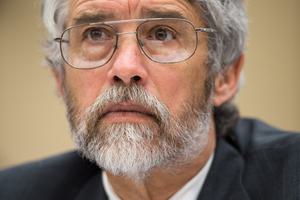In Policy
Politics
-
A Post-Fact World
How the Attack on Science Is Becoming a Global Contagion
-
How Conservative Texas Took The Lead in U.S. Wind Power
Innovative government policies have helped propel Texas into the forefront of wind energy generation in the U.S. But the main impetus for the Lone Star State’s flourishing wind sector is the revenue it has generated for landowners and local communities.
-
Why This Tea Party Leader Is Seeing Green on Solar Energy
As a founder of the Tea Party movement, Debbie Dooley may be an unlikely advocate for renewable energy. But in an e360 interview, she explains why she is breaking ranks with fellow conservatives and promoting a Florida ballot initiative that would allow homeowners to sell power produced by rooftop solar.
-
Will New Obstacles Dim Hawaii’s Solar Power Surge?
Blessed with lots of sun and keen to cut its reliance on imported oil, Hawaii has moved to the forefront of residential solar installations in the U.S. But financial and technical hurdles are slowing the state’s drive to generate 40 percent of its electricity from renewable energy by 2030.
-
As Alberta’s Tar Sands Boom, Foes Target Project’s Lifelines
Exploiting North America’s largest oil deposit has destroyed vast stretches of Canada's boreal forest, arousing the ire of those opposed to this massive development of fossil fuels. Now those opponents are battling the Keystone XL pipeline, which would pass through environmentally sensitive Western lands as it moves the oil to market.
-
Europe’s CO2 Trading Scheme: Is It Time for a Major Overhaul?
Now in its seventh year, the EU’s carbon emissions trading system is the only international program designed to use market mechanisms to control CO2 emissions. But critics contend it has done little to slow the release of CO2 and argue that it should be significantly reformed — or scrapped.
-
Energy Déjà Vu: Obama Must Break with Failed U.S. Policies
Despite soaring rhetoric and some promising proposals, President Obama is repeating the same mistakes that have doomed U.S. energy policy to failure for 40 years. Until Obama and Congress finally put a true price on the fossil fuels America consumes, the U.S. will continue its addiction to foreign oil and domestic coal.
-
A New Pickens Plan: Good for The U.S. or Just for T. Boone?
Three years after unveiling his plan for U.S. energy independence, which won praise from environmentalists for its reliance on wind power, Texas oilman T. Boone Pickens is back with a proposal to convert the U.S. trucking fleet to natural gas. But as his new plan gains traction, questions arise over how green it really is.
-
Can Electric Vehicles Take Off? A Roadmap to Find the Answer
Electric cars are finally coming to market in the U.S., but what is the future potential for this much-touted technology? A good way to find out would be to launch demonstration projects in selected U.S. cities to determine if, given incentives and the proper infrastructure, the public will truly embrace plug-in vehicles.
-
How Fisheries Can Gain From The Lessons of Sustainable Food
As agriculture and energy production have made strides toward becoming more sustainable, the world’s fisheries have lagged behind. But restoring our beleaguered oceans to health will require an emphasis on diversification and conservation — and a more sensible mix of fishing practices.
-
Calculating the True Cost Of Global Climate Change
Researchers disagree about what the economic costs of climate change will be over the coming decades. But the answer to that question is fundamental in deciding how urgent it is to take action to reduce emissions.
-
A Veteran of the Climate Wars Reflects On U.S. Failure to Act
One of the many casualties of the recent U.S. elections was Congressman Rick Boucher, a Virginia Democrat who played a key role in passage of cap-and-trade legislation by the House of Representatives. In an interview with Yale Environment 360, Boucher discusses the bitter failure of the Senate to pass a climate bill and future prospects for tackling global warming.
-
Indonesia’s Corruption Legacy Clouds a Forest Protection Plan
Norway and other nations have vowed to invest billions of dollars to help preserve Indonesia’s remaining tropical forests. But can foreign involvement stem the tide of graft and uncontrolled logging that has steadily decimated one of the world’s largest areas of rainforest?








